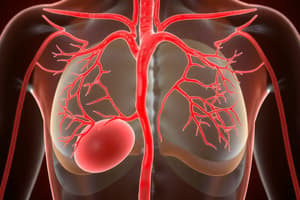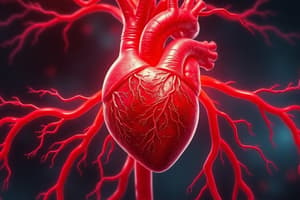Podcast
Questions and Answers
What is the function of pulmonary circulation?
What is the function of pulmonary circulation?
- Generating blood pressure to drive blood flow
- Transporting deoxygenated blood from the heart to the lungs (correct)
- Acting as a muscular pump to circulate blood
- Transporting oxygenated blood from the heart to the body's tissues
Which component of the circulatory system delivers oxygen and nutrients to the body's tissues?
Which component of the circulatory system delivers oxygen and nutrients to the body's tissues?
- Heart
- Pulmonary circulation
- Blood pressure
- Blood vessels (correct)
What is the main function of blood pressure in the circulatory system?
What is the main function of blood pressure in the circulatory system?
- Ensuring oxygen and nutrients are delivered to all body tissues
- Driving blood flow (correct)
- Transporting oxygen and nutrients throughout the body
- Removing waste products from cells
What is the role of the heart in the circulatory system?
What is the role of the heart in the circulatory system?
Which part of the blood is responsible for carrying oxygen?
Which part of the blood is responsible for carrying oxygen?
What is the main function of the blood vessels in the circulatory system?
What is the main function of the blood vessels in the circulatory system?
What is the function of arteries in the transportation system of the human body?
What is the function of arteries in the transportation system of the human body?
Which type of blood vessels is responsible for facilitating the exchange of oxygen, nutrients, and waste products between the blood and the cells?
Which type of blood vessels is responsible for facilitating the exchange of oxygen, nutrients, and waste products between the blood and the cells?
What is the main function of veins in the human transportation system?
What is the main function of veins in the human transportation system?
What are the two separate loops formed by the circulatory system for circulating blood?
What are the two separate loops formed by the circulatory system for circulating blood?
Flashcards are hidden until you start studying
Study Notes
Transportation in Humans: Exploring Blood Vessels and the Circulatory System
In the context of human biology, transportation refers to the efficient exchange of essential resources and waste removal within the body. Specifically, we'll delve into the transportation systems involving blood vessels and the circulatory system, a critical component of our physiological functioning.
Blood Vessels: A Network of Pipes
The human body has a network of blood vessels that function as channels to transport blood, oxygen, nutrients, and hormones to cells and remove waste products, carbon dioxide, and metabolic waste. Blood vessels include:
- Arteries: High-pressure, muscular-walled vessels that transport oxygen-rich blood away from the heart to the body's tissues.
- Capillaries: Microscopic, thin-walled vessels that facilitate the exchange of oxygen, nutrients, and waste products between the blood and the cells.
- Veins: Lower-pressure vessels that transport oxygen-poor blood from the body's tissues back to the heart.
The Circulatory System: A Masterpiece of Engineering
The circulatory system is a complex system that circulates blood throughout the body and plays a vital role in maintaining homeostasis and delivering essential nutrients to cells.
- Circulatory loop: The circulatory system forms two separate loops that circulate blood, one for oxygenated blood (pulmonary circulation) and the other for deoxygenated blood (systemic circulation).
- Pulmonary Circulation: This loop transports deoxygenated blood from the heart to the lungs, where it receives oxygen and releases carbon dioxide. The oxygenated blood then returns to the heart to be pumped to the body's tissues.
- Systemic Circulation: This loop moves oxygen-rich blood from the heart to the body's tissues, where it delivers oxygen and nutrients to cells. The deoxygenated blood then carries waste products back to the heart to be pumped to the lungs.
-
Blood pressure: The circulatory system generates blood pressure, which is essential for driving blood flow and ensuring that oxygen and nutrients are delivered to all body tissues.
-
Heart: The heart acts as a muscular pump that circulates blood by contracting and relaxing in a rhythmic manner.
-
Blood vessels: As mentioned earlier, blood vessels form a complex network that transports blood, oxygen, and nutrients throughout the body, as well as removing waste products from cells.
-
Blood: The circulatory system is responsible for transporting blood, a specialized fluid that contains various substances such as red blood cells (oxygen carriers), white blood cells (immune cells), platelets ( Blood clotting agents), and plasma (a liquid solution containing nutrients, hormones, and waste products).
In summary, the blood vessels and the circulatory system work together to ensure the efficient transport of oxygen, nutrients, and waste products within the human body. This intricate system is essential for maintaining health and preventing diseases.
Studying That Suits You
Use AI to generate personalized quizzes and flashcards to suit your learning preferences.




